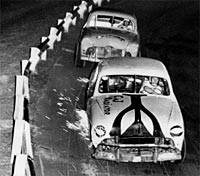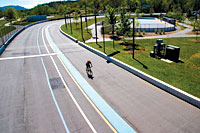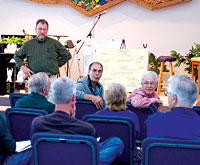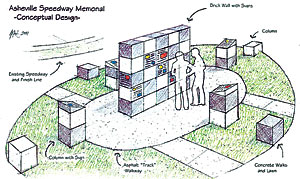For decades, they roared around the blacktop oval down by the French Broad River. They might not have known it at the time, but racing legends were being born, machines were defining and redefining top speed, and the seed was being planted for what would become the nation’s fastest-growing spectator sport. At the Asheville Speedway on Amboy Road, fans gathered by the thousands on weekends, local mechanics made their names in the racing world, and drivers cut their teeth before moving on to bigger tracks.

Then, in 1999, it all went quiet.
In the aftermath of the speedway’s closing, many locals felt a deep loss, notes amateur race-car driver, avid racing fan and City Council member Jan Davis. “Some of the resentment is gone about what’s become of it,” he says, “but there is also some hurt in the community for racing having gone away.”
Davis observes that what became of the racetrack location was the result of a confluence of changes in Asheville, including new development, a desire for more parkland along the river and the track’s disintegrating management.
“I think it all came together to form a perfect storm, and the city was willing to accept the park,” Davis says.
The nonprofit organization RiverLink bought the speedway land and converted it into Carrier Park, then donated the park to the city. Alongside basketball and volleyball courts, a roller-hockey rink and a playground, the track is now lapped by bicycles and dubbed “the mellowdrome.”
Davis is quick to concede the popularity of the park, but he thinks there needs to be some sign, some remnant, of the glory days of Asheville racing, so he’s been rallying community support for a memorial.
The idea surfaced in a July 2004 City Council meeting, after the death of prominent local racer Bob Pressley. Then-Council member Joe Dunn suggested renaming a section of Amboy Road in honor of the champion. Davis suggested building a memorial to the track, and the idea was roundly accepted.

But then, a few months later, floodwaters washed over Carrier Park, causing a backlog of work that needed to be done, and the memorial proposal stalled.
Now, with the park completed and in its best condition ever, Davis wants to see that memorial happen. Raising the $50,000 it would take is no quick lap around the track, however. (The majority of the funding, he says, will be private, though Asheville and Buncombe County may contribute at least a token amount.)
To kick off the fund-raising, Davis is planning for a big day: Thursday, June 21, the day former drivers will return to the Asheville Speedway. (See sidebar for event details.)
To help coordinate the effort, Davis recruited former Mountain Xpress writer Bryan Sarzynski, who wrote about the history of local racing in 2003. (See “Gentlemen, Start Your Memories,” Sept. 24, 2003.) Sarzynski based his article on an oral-history project conducted among racing veterans by the West Asheville Library.
“I did a lot of stories for Xpress over the years, and I just never got the reaction like I got on that story,” he remembers. “I mean, these guys could really spin a yarn.”

Davis, who’s competed in area races such as the Chimney Rock Hill Climb, never did the rounds at the Asheville Speedway. But he was a regular in the stands, and interacted with the racing community that once lined Haywood Road with equipment shops and service stations like the Esso where he held his first job.
The track “was not a pristine place,” he recalls. “It was not a park setting. It was a mud hole after it rained.”
But it was where many folks went for entertainment. You could, Davis says, count on the same people who were at church on Wednesday night being at the track on Friday after work.
Today, there are still local enclaves of racing culture. At the Tastee Diner on Haywood Road, racing fans and drivers like Jack “Ironman” Ingram still gather for lunch. Another champion of the track, Ingram is on the committee to bring about the memorial.
“A lot of history was made there,” he says of the former speedway. Besides the glory of the sport, the track proved an economic driver for people like Ingram’s brother, Tom Ingram, who made a name nationally for building engines.
“I hope someday there can be another racetrack here,” he adds.
Ahead of the curve

Another racetrack? Unlikely as it may seem, the idea is stirring some local buzz of late.
Although he wants the proposed memorial to remain separate from the more controversial idea of a new racing venue, Davis admits that the racing community is thirsty for another speedway.
“There is talk in the air about another track,” Davis says. “Whether we can bring that to fruition, I don’t know.”
Davis breached the idea of building a new racetrack on city-owned land near the Asheville Regional Airport in a casual discussion at City Council’s January retreat. Since then, the idea has gotten a lot of ink, especially in Henderson County, whose border eases up to the proposed property. The issue has sparked letters and discussion in Council chambers, where Davis has rounded up at least enough support to explore the idea.
Still, the proposal is in its early stages, at most. For now, Davis has been contacting other regional tracks to gather information on how issues like racecar noise have been handled. “We have done the least amount of due diligence on this,” he said at a March 13 Council meeting.
But one group of airport-area residents is not waiting for more concrete proposals before weighing in. Responsible Opposition to Airport Racetrack has met once a month since Davis floated the new-racetrack idea. ROAR organizer Michael Winner, a real-estate agent by trade, points to subdivisions and commercial developments springing up all over the area’s bucolic farmlands.
“This is an area in transition,” he says. “It is perhaps the most rapidly growing area [in Buncombe County]. I don’t think the folks in Asheville have an idea what this area has changed to.”
The group is airing concerns about noise near the site, traffic along Fletcher’s back roads and the fact that the airport location is in a floodplain. And despite the fact that there has not been a formal proposal to build the track, Winner plans to stay ahead of the curve. Raising awareness early, he says, is his group’s best weapon.
“The general reaction in the community is, ‘Oh, I haven’t heard anything about it,’” he says.
But word is getting out. At ROAR’s last meeting, a handful of racing supporters showed up to join the discussion, and Winner concedes that their words had merit.
“They made some very good points about the heritage of racing,” he says. “We’re not against racing. We’re just saying don’t put it in a drainage basin in a growing area.”
Clearly, proponents of a new track would have many obstacles to overcome. In City Council, examining the prospect has gained only slight nods, and the track would also need approval from the Airport Regional Airport Authority and the Federal Aviation Administration. The Authority’s board chair, City Council member Bryan Freeborn, told Xpress that the board is holding off on an opinion until a formal proposal is made. And the FAA, he says, does not support the idea.
Old wounds heal hard
In the meantime, Davis and his memorial committee have the pedal to the metal, and he hopes the gesture will appease some of the disappointment wrought by the speedway’s closing.
The minutes of City Council meetings in 1999 reveal dramatic exchanges, as the local racing community attempted first to keep the track alive and then to squeeze in one more racing season. Appeals were made to continue using the track until another speedway could be built in Haywood County, a project that never came to fruition.
“This was all happening when Asheville was going through a lot of change,” Sarzynski recalls. “It was [about] more than just the racetrack. To people who were native [to Asheville], this is symbolic of a lot of things changing.”
Some anger lingers, and the voices of racing aficionados are still there.
“That track was taken away from the racing people and turned into a park that a few people use and doesn’t pay anything [in tax revenues],” Ingram asserts. (In fact, the park is used by thousands of visitors each year for recreation and entertainments ranging from various sports leagues to the Mountain Sports Festival to the Eggstravaganza Easter-egg hunt.)
While he may or may not be able to muster support for a new racetrack, Davis hopes to leverage the support of local racing fans for the Asheville Speedway memorial, which he hopes will be built at Carrier Park. For the upcoming fund-raising kick-off, he’s seeking permission to briefly break the restriction on racing that was placed on the park when it was donated to the city, allowing a car or two to circle the track that’s there now.
“Not ‘hot’ laps,” he insists—just a trip around to show people what the track was originally built for.
It’s a chance for both remembering and reconciliation, Davis notes. The memorial committee he formed has representatives from other feuds and fusses, like Jack Ingram and Bob Pressley’s son, Robert Pressley Jr., whose families had a racing rivalry that once led to blows.
“There is an opportunity here to show the racing community” to its neighbors, Davis says, “and that there is a desire for racing, and that we’re at least exploring the idea of making that happen again.”
Asheville Speedway Memorial Fund-raiser
The kickoff fundraiser for the Asheville Speedway Memorial will be held Thursday, June 21, at Carrier Park. The master of ceremonies will be former basketball star and current ESPN NASCAR analyst Brad Daugherty.
For more information, contact Jan Davis at 253-5634 or jandavis@main.nc.us Donations can be made to care of the Eblen Center, 12 Regent Park Blvd., Asheville NC, 28806. One hundred percent of the donations will go toward the memorial.


It’s a shame what’s happened to many of the local tracks. Some come, some go, but some are re-opened as well. The Dillon Motor Speedway in Dillon, SC is just one example of a track that closed down. It ran from 1964 to 1982 or 83, closed for over 20 years, and was later purchased by former NASCAR driver Ron Barfield in 2005, and was paved, a complete wall installed, upgraded lights, a new scoreboard as well as other additions to this 4/10 formal dirt oval. DMS re-opened in 2007. What happened in Asheville with your speedway happened as well to the Columbia Speedway, at Columbia, SC in the late 70s when the town it sat in voted in laws that didn’t close the track down, a track that launched careers for those like Richard Petty, but it made operation next to impossible. In the last 10 years IT has been re-opended as a bicycle track, and people seem to like it. What I see is small tracks going more regional and racing at tracks like the former NASCAR track at Rockingham. Traveling that far is probably out of the question for some or even many, but it’s the way I’m afraid the sport is going; a little more regional in some places, but not all. Tom Seay, Mullins, SC.
I think we need a new track – the dirt track scene is family friendly and a lot of fun to watch. In the right spot it would be a wonderful addition and right in line with modern mountain history.
Go see a race at a good track like Bulls Gap Tazewell (both TN) and see what I mean.
http://maps.google.com/maps/ms?ie=UTF8&hl=en&msa=0&msid=101814633281212578634.00046cbfab0d0dcc6fc0f&t=h&z=7